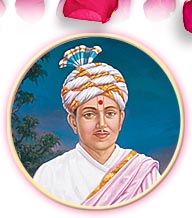|
Pledge
Ame Sau Swamina balak...
We are the children of Swami; we will die for him. We are the youths of Shriji Maharaj; we will fight for him. We are fearless; we will not shirk sacrificing our lives, for we are born to die. We have launched this movement, and will undergo any suffering. We will sing the praises of Akshar-Purushottam. We are the sons of Shriji; we have our abode in Akshar. Consecrated as we are to swadharma, we have no apprehension whatsoever. Bhagwan Purushottam and Akshar, Gunatitanand Swami, are with us. We have accomplished our goal.
A
Adharma = Unrighteousness
Agna = Tenet, commandment
Aksharrup = Form of Akshar.
Annakut = Festival in which varieties of vegetarian delicacies are offered to God
Antahkaran = Conscience
Anuvrutti = To follow intuitively
Arti = Lighted wicks
Asan = Posture; seat
Atma = Soul
Atmabuddhi = Intense affection
Atmarup = Behaving as atma
Avatar = Incarnation
B
Babula = Weaklings
Bhagwati diksha = Initiation into a sadhu in saffron robes
Bhajan = Song singing the glory of god
Bhakta = Devotee
Bhakti = Devotion
Bhandari = Store-keeper
Bhim Ekadashi = Jeth sud 11
Brahma = Aksharbrahma
Brahmacharya = Celibacy
Brahmagnan = Knowledge of Brahma
Brahmarup = Form of Brahma
Brahmavidya = Knowledge of Brahma
Brahmic = Pertaining to Brahma
C
Chandan = Sandalwood
Cheshta = Verses describing the daily routine and divine form of Shriji Maharaj
Chintamani = Wish-fulfilling gem
D
Dandvat = Prostration
Darbar = A regional ruler
Darshan = To see with reverence and devotion
Dham = Short form for Akshardham, abode of Bhagwan Swaminarayan
Dharma = Righteousness
Dhoti = A garment wrapped round the waist and tucked to dress the lower part of the body.
Dhun = Chanting the name of God
Dhyan = Meditation
Diksha = Initiation
Divyabhav = To firmly believe that God and His Sadhu are divine
Diwan = Minister
Dosh = Moral flaws
Dudhpak = Sweet, thickened milk with rice
E
Ekadashi = The eleventh day of each half of a lunar month
Ekantik bhakta = God-realised devotee
Ekantik dharma = Collective term for dharma, gnan, vairagya and bhakti.
Ekantik sthiti = Brahmic state
F
Fagva prasadi = Sanctified food of popcorn and dates.
Fakir = Muslim mendicant or ascetic
Fagan = A month of the Hindu calendar (February-March)
Fuldol = Festival of colours
G
Gnan = Knowledge; wisdom
Gnani = A wise person
Gorakh = A type of yogic posture
Granthi = Complex
Guna = Innate nature
Gunatit = Transcends the three gunas
H
Haveli = Mansion
Hindola = Swing
Hriday-granthi = Desires
Hutashani = Holi festival
I
Ishwar = Second of the five eternal realities
J
Jal Jhilani Ekadashi = Bhadarva sud 11
Jamadar = Head constable
Janmashtami = Birthday of Shri Krishna, Shravan sud 8.
Jiva = Soul
Jivanmukta =Redeemed during this very life
K
Kalyan = Salvation; liberation
Kartik = A month of the Hindu lunar calendar (October-November)
Khatras = an observance in which only food devoid of the six types of taste – sweet, salty, bitter, sour, spicy – is eaten.
Khes = Silken scarf
Khuda = God
Kirtan = Devotional song
Kothari = Chief administrator of mandir
M
Mahant = Chief priest; pontifical head of a mandir
Mahaprasad = Sanctified food
Maithun-granthi = lust
Mala = Rosary
Mamatva-granthi = Attachment to self
Mandal = Group
Mangala arti = First arti of the day, performed at sunrise
Maya = Third of the eternal realities
Moksha = Redemption
Mul Akshar = The eternal and primordial form of Akshar
Murti = Image; idol
Murti-pratishtha = Consecration of murti in a mandir
N
Naivedya = Food offered to a deity
Nishchay = Absolute faith
Nishkam vrat = Vow of celibacy
P
Paras = Philosopher’s stone – magical stone which turns iron into gold
Paravidya = Wisdom of God
Parna = Breaking of fast
Parshad = Male renunciant in white robes
Pativrata = Fidelity
Pranam = Obeisance offered with folded hands
Prasad = Consecrated food
Puja = Worship
Pujan = Religious rites
Punya = Merits
Puranpoli = Sweet delicacy
R
Rajbhog arti = Third arti of the day performed after lunch has been offered to the deities
Rotlo = Millet bread
S
Sadguru = Senior sadhu
Sadhak = A person endeavouring on the spiritual path
Samadhi = Trance
Sangh = Group
Sanshay-granthi = Doubts
Sach-chid-anand = Truth-consciousness-joy
Satsang = Good company; spiritual association
Satsangi = One who practices satsang
Seva = Service
Sevak = One who serves
Shangar arti = Second arti of the day; performed after breakfast has been offered and the murtis have adorned with garments, ornaments and garlands.
Shvet dharma = A vow to avoid the company of women
Sneh = Attachment
Sud = Bright half of each lunar month of the Hindu calendar
Swadharma = One’s own dharma
Swarup = Form
Swarupnishtha = Understanding and resolve in the true form of God
Swastik asan = Cross-legged posture
T
Thal = Offering of food to the deities
U
Upasana =Philosophical understanding of the nature of God; mode of worship
V
Vairagya = Detachment
Vartman = Vows
Vishay = Worldly pleasure
Vrat = A Spiritual observance
V.S. = Vikram Samvat – the Hindu year from the reign of King Vikram
|






